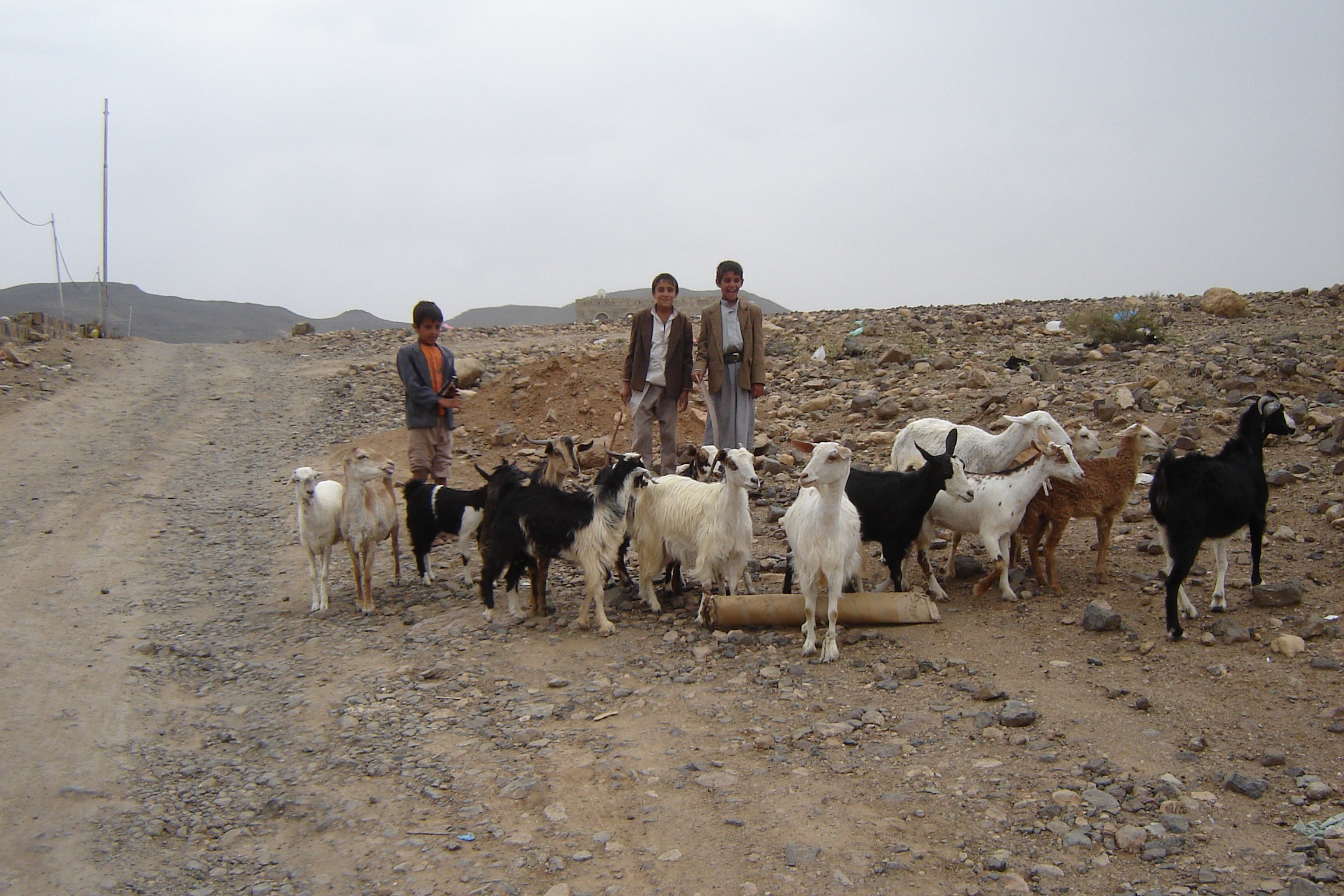“Now we use grain as animal fodder to complement grazing but fodder prices have increased threefold over the past two years,” said Ali al-Qanis, aged 74, a local herder with 50 sheep. “These steep price hikes mean a sheep or goat is becoming a financial liability.”
To make matters worse, the selling price for a breeding ewe had dropped from around YR18,000 (US$89) in early 2008 to YR11,000 ($54) in 2009, he said.
While livestock farming constituted only 2.5 percent of Yemen’s GDP in 2008, according to Deputy Minister of Agriculture and Irrigation Mohammed Al-Ghashm, it is an important source of revenue in several parts of southeastern Yemen, which has been hit by frequent droughts.
Livestock is the main income source for over three million people in the southeast, according to Mansoor al-Qadasi, director-general of animal health and veterinary quarantine, based in Sanaa.
Al-Qadasi said malnutrition was to blame for a drop in dairy production, high abortion rates and the spread of blood parasites and epidemics among ruminants. “Thousands of sheep and goats die of malnutrition... We have no accurate data on animal mortality as it is difficult to get from herders, most of whom are illiterate or lack awareness,” he told IRIN.
|
Photo: Adel Yahya/IRIN  |
| Hardly any herding communities have water networks, relying only on underground cisterns filled by rainwater |
Al-Qadasi urged donor countries to help Yemen by providing capacity building training for herders, and training on how to cope with drought through pasture management and efficient fodder storage. “They can support epidemic surveillance programmes at the Agriculture Ministry to expand field activities,” he said.
Abdullah Al-Numan, an environment specialist at Sanaa University, said the Agriculture Ministry should train herders on grass management, random grazing prevention and provide them with tanks to harvest rainwater for use during dry seasons.
Families who are entirely dependent on herding for their livelihoods are the most affected by drought, as they have no alternative sources of income. These families lack the skills to take up alternative crafts or jobs, according to Ahmad Tallan al-Harithi, chairman of the Brotherhood Society for Social Development (BSSD) in Shabwa, about 400km east of Sanaa.
“Shabwa, where 65 percent of its 466,000 population are in rural areas raising cattle and growing crops, hasn’t seen any good rainfall for the past 12 years,” al-Harithi told IRIN. “Over 300,000 herders and farmers in Shabwa and roughly the same number in the nearby provinces of al-Beidha, Marib and Lahj are affected by drought.”
In times gone by, when rainfall was more abundant and predictable, herders could expect to triple the number of their livestock within two or three years. “But these days, sheep and goats die of malnutrition… tens of thousands of herders have drifted from cattle-raising as a result,” Mohammed al-Aidarous, a local councillor from al-Beidha, some 160km southeast of Sanaa, told IRIN.
“Families in these communities, particularly herders, face extreme poverty and life-threatening food insecurity… They are under growing pressure to sell their livestock at lower prices,” he said. “Thousands of herders are moving with their livestock to faraway areas in search of pasture.”
Hardly any herding communities have water networks. They rely only on underground cisterns filled by rainwater - if there is any - or trucked-in water, al-Aidarous said, adding that trucked water was sold at a higher price in remote villages.
In al-Qabbaita District of Lahj Province, 300km south of Sanaa, more than 40,000 pastoralists face difficulties accessing drinking water for themselves and their livestock, he said.
|
Photo: Muhammed al-Jabri/IRIN  |
| Some 35 percent of Yemen'spopulation of 21 million live beneath the poverty line |
Hani Merai, a veterinarian working for the Ministry of Agriculture, said prices for good quality barley fodder are at record highs - increasing from YR500 ($2.5) to YR950 ($4.75) per 12-kg sack - while cheaper alternatives can cause malnutrition resulting in a variety of health problems including high abortion and young lamb mortality rates.
“Fodder increases an animal’s need for water and as the drought continues, extra water must be bought,” he said. “Making a livelihood from livestock is not that easy.”
Herders are in urgent need of government support to help their flocks survive. “Unless there is immediate support to herders with subsidized feed and water, many of them will be forced out of herding and the livelihood that has supported them for decades will be lost,” al-Harithi said.
ay/ed/cb
This article was produced by IRIN News while it was part of the United Nations Office for the Coordination of Humanitarian Affairs. Please send queries on copyright or liability to the UN. For more information: https://shop.un.org/rights-permissions




